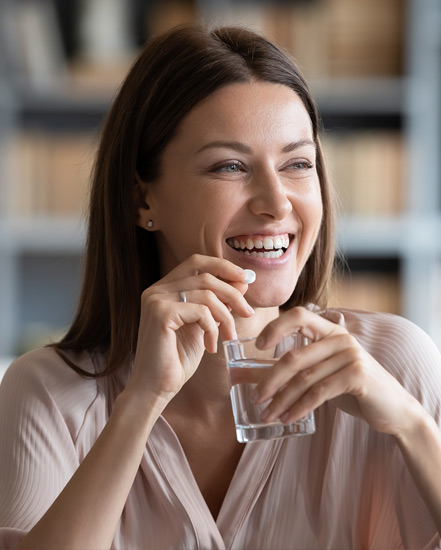Want to know all about Biotin and how it can benefit your hair, skin and nails? Read all about it below.
Jump to:
If you sometimes find your nails brittle, your hair dry, and your skin dull, it could mean you are not getting enough of specific vital vitamins and minerals. There are thousands of products on the market for maintaining beautiful hair, skin and nails. However, the basic building blocks for keeping these healthy can be supplied naturally by eating a healthy, balanced, vitamin-rich diet, which can help give your body all of the nutrients it needs to stay function properly. Always consult your doctor if you have any concerns about your health and wellbeing.
The importance of Protein
Like our muscles, our hair, skin, and nails are all made of Protein. Therefore, your diet should always have enough of it in.
Complete proteins are proteins that contain all nine essential amino acids. Essential amino acids are amino acids that the body cannot make from scratch and must be obtained through the diet. Examples of food sources that can be considered complete proteins are:
Beef
Pork
Poultry
Fish
Milk
Cheese
Eggs
Soy
Quinoa
Skin
Here are 3 interesting facts about your body's first line of armour.
The skin is the largest and fast-growing organ of the body.1
External factors heavily influence the skin because it is our body's first line of defence against outside elements.
It is also possibly one of the first things people notice about you (besides hair perhaps) and where the first visible signs of ageing appear.
Therefore, maintaining healthy, radiant skin isn't just about looking good.
Nails
Zinc and selenium support the maintenance of normal nails. The mineral is found in brown bread, cheese, meat, and wheat germ, and it is recommended that we get 10mg of zinc daily.
Whenever you want to look your best on the outside, start by monitoring what your body takes in through your diet. This would be one of the best starting points.
So how can Biotin help?
Biotin plays a role in the most fundamental process in your body – converting food into energy – and helps maintain normal skin, hair, and the normal function of the nervous system.
This is one of the reasons why, unsurprisingly, food diets and the general health of your skin and hair are so intricately connected.
You only need a small amount of Biotin a day, 50 µg, and you may be able to get all you need from your diet.
Key foods to give you more Biotin:
Eggs
Avocado
Cauliflower
Berries
Fish
Mushrooms
Seven Seas Omega-3 & Multivitamins WOMAN and Omega-3 & Multivitamins WOMAN 50+ offer a comprehensive range of various nutrients, including Biotin. Find out how this product can help you more.
What else can Biotin help with?
Biotin also plays a role in the body's metabolic functions. This B-complex vitamin helps process food that you digest, including carbohydrates, proteins and fats*.
Other health benefits of Biotin include its role in supporting the maintenance of normal hair. Any improvements made to your diet will be a bonus for your hair.
A well-balanced diet is rich in proteins and carbohydrates – which contain vital essential vitamins and minerals.
Biotin and Zinc help maintain normal hair. Proteins consist of amino acids (some essential and some non-essential). Essential amino acids are more abundant in animal protein. It also helps to maintain healthy skin.
Vitamin C and your skin
The antioxidant properties of vitamin C – and the part it plays in collagen formation – makes it an essential property for healthy skin. As we get older, vitamin C in our skin declines, so ensuring we get adequate amounts from our diet or supplementation can help keep our skin looking healthy.
Vitamin C is found in:
Oranges
Strawberries
Broccoli
Peppers and many other sources.
As vitamin C dissolves in water, it means that it cannot be stored in our bodies. This means that any excess vitamin C will be excreted from the body in our urine. Humans cannot make vitamin C from scratch; therefore, adults should ensure they get the recommended 80 mg each day.
Vitamin E and the skin
The skin is not only the body's largest organ, but it is also the first line of defence against the elements.
Vitamin E can be found in foods including nuts, seeds, and wheat germ. And we need to ensure we are getting 12 mg a day to help support your skin.
References:
1 Yousef H, Alhajj M, Sharma S. Anatomy, Skin (Integument), Epidermis. [Updated 2020 Jul 27]. In: StatPearls [Internet]. Treasure Island (FL): StatPearls Publishing; 2020 Jan-. Available from: https://www.ncbi.nlm.nih.gov/books/NBK470464/
2 Placzek M, Gaube S, Kerkmann U, Gilbertz KP, Herzinger T, Haen E, Przybilla B. Ultraviolet B-induced DNA damage in human epidermis is modified antioxidants ascorbic acid and D-alpha-tocopherol. J Invest Dermatol. 2005 Feb;124(2):304-7.

OMEGA-3 & MULTIVITAMINS WOMAN
More than a multivitamin – this multivitamin tablet for women has been paired with an Omega-3 capsule. Supports your Whole Body Health+. Our 2-in-1 pack solution combines a women’s multivitamin tablet – which we’ve specially formulated for women by adding Biotin for Energy4 Release and Iron for Tiredness & Fatigue5 – with an Omega-3 capsule to support the normal function of the heart1, brain2 and vision3.




